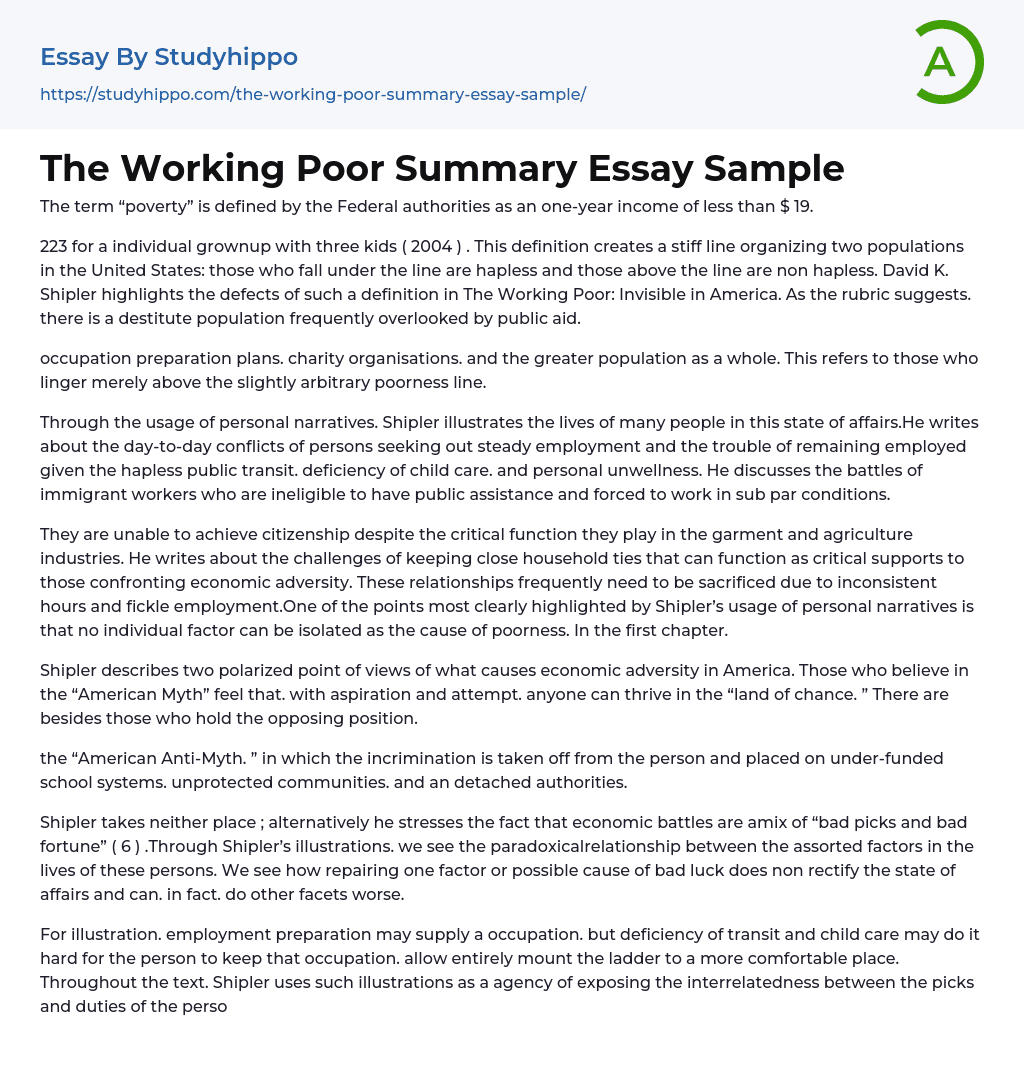According to Federal authorities, poverty is defined as having an income that falls below $19 per year.
The United States set a poverty standard in 2004, defining it as an income lower than 223 for an adult with three children. This separates the population into two categories: poor and non-poor. Nevertheless, David K. Shipler's book The Working Poor: Invisible in America reveals the insufficiencies of this classification and highlights a marginalized group that government aid programs often overlook.
The preparation plans for occupation, charities, and the general population prioritize individuals who are slightly above the poverty threshold.
Shipler depicts the trials of individuals confronting diverse obstacles through personal anecdotes. These hindrances encompass the quest for stable employment, hindered by insufficient access to public transportation, inadequate childcare options and personal sickness. Furthermore, he touches upon the predicaments con
...fronted by migrant laborers who are not qualified for state aid and compelled to work in unfavorable surroundings.
Despite their crucial role in the garment and agriculture industries, these individuals are unable to attain citizenship. The author discusses the difficulties of maintaining close familial connections, which can serve as crucial aid to those facing financial hardship. Unfortunately, these relationships often must be forfeited due to fluctuating work schedules and unreliable employment. Through the use of personal stories, Shipler emphasizes the fact that poverty cannot be attributed to any single factor. This is most apparent in the first chapter.
Shipler distinguishes between two opposing views on the cause of economic hardship in America. Supporters of the "American Myth" believe in the possibility of success for anyone who works hard and pursues their dreams in the "land of opportunity." In contrast, others maintain a different perspective.
Th
"American Anti-Myth" argues that responsibility should be shifted away from individuals and instead placed on underfunded schools, vulnerable communities, and a disconnected government.
Rather than taking sides, Shipler highlights the mix of "bad choices and bad luck" (6) in economic struggles. Shipler's examples illustrate the paradoxical relationship between various factors in people's lives, demonstrating that fixing one factor or potential cause of misfortune does not necessarily improve the situation and may even worsen other aspects.
Shipler provides examples demonstrating how limited resources can hinder individuals' ability to maintain employment, despite employment preparation leading to a job. Such obstacles as lack of transportation and child care make it difficult for individuals to climb the ladder to a more comfortable place. These examples highlight the interrelatedness between the choices and responsibilities of individuals and their restrictions due to limited resources.
The Working Poor, according to David Shipler, face a shortage of assistance and a society that often overlooks their needs. Bibliography: Shipler, David. "The Working Poor"..
- Overpopulation essays
- Homelessness essays
- Hunger essays
- Dumpster Diving essays
- Homelessness In America essays
- American Literature essays
- Between The World and Me essays
- Book Report essays
- Book Review essays
- Book Summary essays
- Books essays
- Character essays
- Coming of Age essays
- Dante's Inferno essays
- Everyday Use essays
- Flowers for Algernon essays
- Genre essays
- Greek Mythology essays
- Incidents in The Life of a Slave Girl essays
- Letter essays
- Literary Criticism essays
- Literary devices essays
- Literature Review essays
- Metaphor essays
- Myth essays
- Play essays
- Plot essays
- Poem essays
- Poetry Analysis essays
- Protagonist essays
- Reader essays
- Reason essays
- Rhetoric essays
- Rhetorical Question essays
- Rhyme essays
- Simile essays
- Tragic Hero essays
- Translation essays
- Understanding essays
- Utopia essays
- Villain essays
- Writer essays
- American Dream essays
- Barriers To Entry essays
- Capitalism essays
- Central Bank essays
- Compensation essays
- Consumerism essays
- Economic Development essays
- Economic Growth essays




